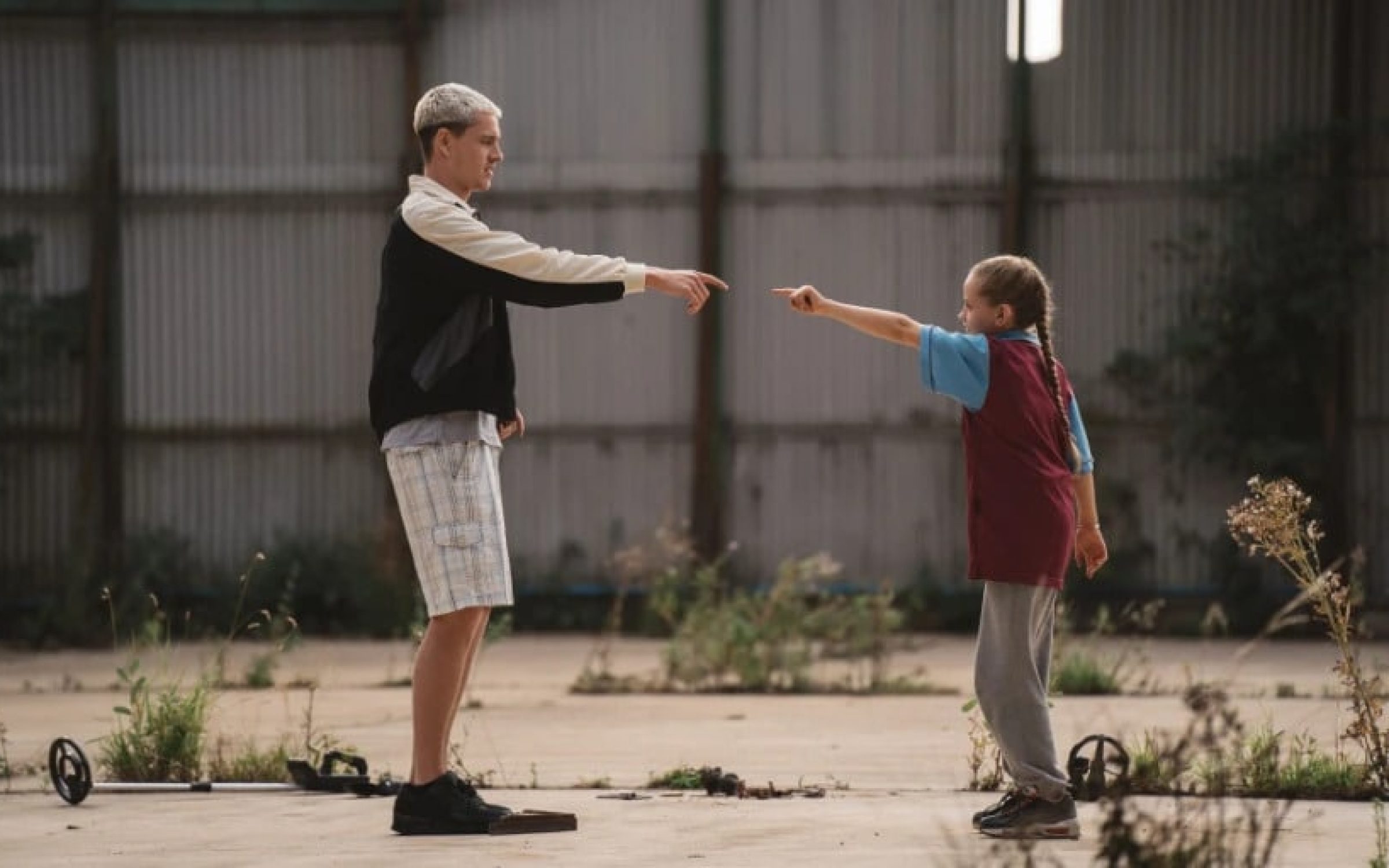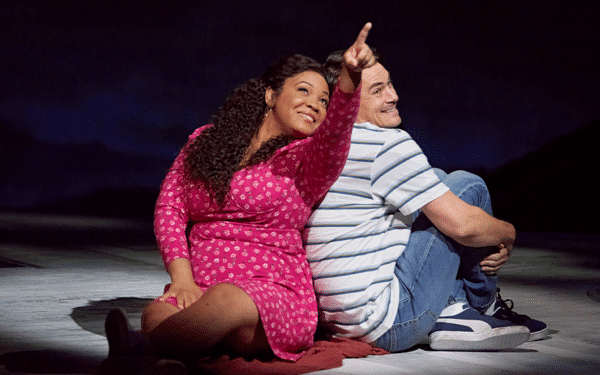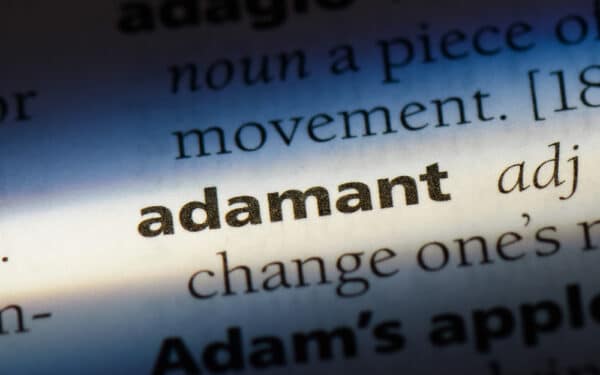If kitchen sink realism was a person, it would probably be some poor soul on their last legs washing down fluoxetine with a gin chaser. Nevertheless, in her debut feature-length film, Scrapper, Charlotte Regan reminds us that it needn’t be this way. Whilst situating itself within the back-against-the-pebble-dash-wall tradition, Scrapper infuses the genre with joy, laughter, and insouciant backchat. If life is gritty on Scrapper’s council estate, at least it isn’t grey and drab. In Regan’s Essex, the walls get a well-needed slap of pastel-coloured paint and social realism gets a healthy dose of magic and satire.
Living alone following the loss of her mother to cancer, the protagonist, and feisty pocket-sized heart of the story, 12-year-old Georgie, spends her ‘stages of grief’ lying to social services about her living conditions and swaggering around in a vintage West Ham shirt trying to flog stolen bikes. Lola Campbell, at only eleven when filming for her debut role, is not only a very believable blagger but also a remarkably promising talent. She commands both sass and complicated emotions with seeming ease and panache (even if her improvised backchat does become a tad too forced at times).
When not peddling stolen bikes, Georgie wanders aimlessly through her days, creating dance routines, tidying the house and mourning – unable to pick a show to watch on Netflix and careful not to disturb her late mother’s tidy arrangement of cushions.
This is until Georgie’s dad, Jason – played by Harris Dickinson in a star-making performance – hops over the back garden fence and into Georgie’s life. Donning Air Max 90s, a shell jacket, and bleached blonde hair, Jason – a deadbeat dad but nevertheless loveable lad – looks as if he’s still recovering from a heavy night on the town. And he is: a night out that lasted twelve years. He’s been in Ibiza – selling “tickets” all that time, apparently. When asked if he’s learned any Spanish he says, “yeah,” which becomes, “a little bit,” before finally: “I understand most of it.”
Having had Georgie at eighteen, Jason is thirty when he turns up in his daughter’s life. He’s the archetypal modern-day man-child. A Peter Pan party boy, a pill-peddler, who’s spent too long carousing in the Mediterranean sun and thus no time fulfilling his duties as a father – nor even trying to, as Georgie reminds him. Jason inevitably struggles with his own dubious self-justification for abandoning his daughter, and Dickinson brings a lugubrious undertone to the role of the ex-raver pretty boy on the comedown of his life.
Outside the family, we have mockumentary-style interviews with inept social services and indifferent teachers. These minor characters are drawn as exaggeratedly cold and credulous – more Dickensian than Loachian. This heightened social realism gives the film licence to mock the breakdown of societal institutions without letting us feel sorry for the have-nots (albeit it sacrifices some emotional depth in the process).
Most brazenly, the film critiques a culture dependent on neat labels for our mental condition. “I’ll get through the other stages [of grief] quick,” Georgie says listlessly, as if at twelve years old, she already knows the fatuousness of these reified concepts. It’s not popular psychology or bureaucratic social services that our precocious heroine needs. It’s guidance and love – whether she can bring herself to admit that or not.
Despite Georgie’s initial unwillingness to accept Jason, there is a candour in the duo’s chemistry that establishes itself instantly. No mean feat. In a Q&A at the film’s BFI pre-screening, Dickinson joked that Regan left the pair to their own devices on a playground, and, rather than coming up with any workable material, Dickinson and Campbell spent the whole time kicking a tree.
The film also features a diverse cast, but this is more matter-of-fact rather than some Disney-esque attempt at do-gooding. In fact, Georgie’s best friend, Alin – and his Multicultural London English (MLE) accent – is often the brunt of this predominantly cockney film’s many jokes (not in the least because he doesn’t know who a certain East-End cultural icon, David Beckham, is). And cockney wind-up merchant, Georgie, doesn’t let this slide. Nevertheless, different ethnicities and accents co-exist as a fact of life in Scrapper’s social fabric – as real as single-parenthood and stolen bikes; and equally as ripe for taking the Mickey out of, too.
By exploring morally difficult terrain without pulling your heartstrings, nor shoving ideas down your throat, Regan laudably attempts (as Oscar Wilde once said we must) to “play gracefully with ideas”. The film does, however, leave a few things untied: there’s an awkward moment, with hints of romantic chemistry, between Jason and Alin’s mum which ultimately leads nowhere. Moreover, we’re never given any answer as to where Jason got a handful of bank notes from – but it’s unlikely you get fat wads of cash from promoting events alone.
At the pre-screening, Regan said she gave up on trying to make the script perfect. Instead, she saw Scrapper as an imperfect plot with loose ends which mirrors the messiness, and lack of unity, in life. Whether you accept the art-mirroring-life pitch or not, it’s undoubtedly an incongruous conceit in an ice-cream-coloured outing which features talking spiders in video-game stylised asides.
Whilst the balancing act between satire and seriousness is not always spot on, this is, however, a refreshing film with a lot of heart and promise. In a tradition where (mostly middle-class) auteurs depict bottom-rung strife as emotional poverty porn, Scrapper answers back with some playful misbehaving. With no Brit-school cast member in sight, Regan’s debut is an authentic attempt to resuscitate a genre that has been left in rent-burdened and gin-soaked depression for too long.
Write to us with your comments to be considered for publication at letters@reaction.life




